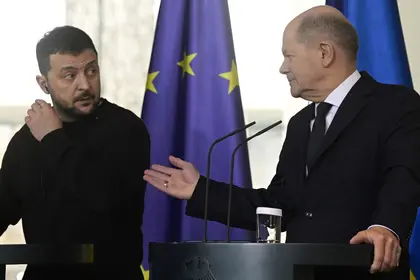Germany’s governing coalition is increasingly divided over the country’s Ukraine policy, with Chancellor Olaf Scholz’s Social Democratic Party (SPD) caught in the crossfire by its coalition partners due to softening its stance on support for the war-torn country.
Last week’s speech by SPD parliamentary leader Rolf Mützenich, in which he rhetorically asked whether it was not time to “think about how to freeze a war and end it later,” sparked controversy within the ruling coalition.
JOIN US ON TELEGRAM
Follow our coverage of the war on the @Kyivpost_official.
While he tried to backtrack on his comment on Saturday, his coalition partners feared that the statement could shift the SPD’s Ukraine policy.
“Mützenich’s disparaging remarks about those in the coalition who think differently and his uninspiring words about freezing the conflict, together with the Chancellor’s government statement, represent a turning point in foreign policy,” liberal Free Democratic Party (FDP) parliamentary group deputy leader Michael Georg Link told Tagesspiegel on Sunday.
Last week, Scholz strongly defended his decision not to send Taurus missiles to Ukraine, drawing criticism from his coalition partners.
“What is the ‘Zeitenwende’ still worth if Scholz and Mützenich only ever help Ukraine just enough to prevent it from sinking at the moment?” Link added.
Scholz announced the ‘Zeitenwende’ – or major turning point – following the outbreak of the war in Ukraine as a complete readjustment of German foreign policy.

British Defence Intelligence Update Ukraine 23 January 2025
Mützenich’s call for a freeze on the war in Ukraine has also caused considerable backlash from the other coalition partner. Green Party leader Ricarda Lang told Die Welt that his speech marked a “relapse into the old Russia policy of the Social Democrats.”
On Saturday, SPD heads gathered for a party retreat and defended the views of their group leader.
While emphasising her party’s unwavering support for Ukraine, SPD leader Saskia Esken said that the SPD would “naturally also share the longing for peace, which is especially felt by Ukrainians.” She added that the SPD appealed to the Russian president to return to the negotiating table.
The opposition CDU party also waded into the debate, warning that the SPD is currently testing the waters with the idea of freezing the conflict. According to CDU foreign policy spokesperson Roderich Kiesewetter, the SPD still has a problem with the “romanticisation of Russia that is now catching up with us in Germany in a terrible way”.
Meanwhile, Scholz’s hesitancy to supply Taurus missiles continues to spark conflict within the coalition.
On Friday, highly sensitive information that allegedly justified Scholz’s hesitancy to deliver Taurus missiles was leaked to the news website t-online. The article contained information from a secret meeting of the Bundestag’s defence committee, which was subject to strict confidentiality.
While it is not known who leaked the information, both Green and liberal members of the defence committee were quick to criticise the move heavily. Marie-Agnes Strack Zimmermann, a liberal member of parliament and chair of the defence committee, even threatened to take legal action.
“Leaking information from a secret committee meeting is not a trivial offence. The charges are pending. Anyone who betrays secrets to push through their own agenda has no place in parliament,” she said on X.
Her colleague from the Greens also weighed in.
“Here is someone with very obvious vested interests blabbing from a meeting that was classified as secret & claiming things that are very distorted, to put it kindly,” Green MP Agnieszka Brugger said on X.
“Even taking into account all the classified information, I still think a delivery from Taurus is overdue,” she added.
(Oliver Noyan | Euractiv.de)
You can read the original here.
You can also highlight the text and press Ctrl + Enter










